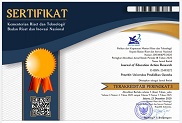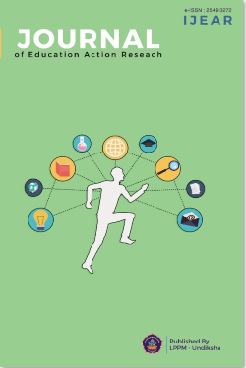Soft Skill Oriented Project Based Learning Training Module in Center of Excellence Vocational High School
DOI:
https://doi.org/10.23887/jear.v6i2.44664Keywords:
Project based Learning, Soft Skill, SMK Center of ExcellenceAbstract
Program pelatihan untuk guru-guru Bahasa Inggris yang dilaksanakan selama ini belum menyentuh esensinya dan belum memberikan bukti nyata. Hal itu dikarenakan belum adanya modul atau acuan yang digunakan oleh guru-guru dalam mengikuti pelatihan selama ini, Ditambah lagi tidak ada tindak lanjut dan evaluasi setelah pelaksanaan diklat. Penelitian ini bertujuan untuk mengembangkan modul pelatihan model pembelajaran berbasis proyek berorientasi soft skill untuk guru Bahasa Inggris di SMK. Subjek penelitian adalah guru-guru Bahasa Inggris dari empat SMK. Penelitian ini menggunakan model pengembangan ADDIE. Metode penelitian menggunakan deskriptif kualitatif-kuantitatif. Pengumpulan data dilakukan melalui wawancara mendalam, test, observasi, dokumentasi, dan survey di lapangan. Hasil penelitian menunjukkan bahwa model pembelajaran berbasis proyek sesuai dan bagus dilakukan dalam pengajaran Bahasa Inggris di SMK; materi diklat Bahasa Inggris di SMK selama ini dilaksanakan secara bersamaan dengan mata pelajaran lain; materi diklat Bahasa Inggris yang diberikan di SMK sebatas pemberian materi melalui powerpoint dari instruktur; modul pelatihan yang dikembangkan mendapatkan validasi dari 3 ahli memenuhi kriteria sangat valid (>80%). Hasil observasi pelaksanaan pelatihan dengan modul pelatihan mendapatkan hasil 84% berkategori baik. Tanggapan guru terhadap modul pelatihan sebesar 83,55% berkategori baik. Pelaksanaan pelatihan menggunakan modul menunjukkan adanya peningkatan kompetensi guru sebesar 86,6%. Modul Pelatihan yang dikembangkan terbukti sangat valid dan efektif untuk meningkatkan kompetensi guru-guru Bahasa Inggris dalam pengajaran di kelas.
References
Abidin, Z., Rumansyah, & Arizona, K. (2020). Pembelajaran Online Berbasis Proyek Salah Satu Solusi Kegiatan Belajar Mengajar di Tengah Pandemi Covid-19. Jurnal Ilmiah Profesi Pendidikan, 5(1), 64–70. https://doi.org/10.29303/JIPP.V5I1.111. DOI: https://doi.org/10.29303/jipp.v5i1.111
Aditia, M. T., & Muspiroh, N. (2013). Pengembangan Modul Pembelajaran Berbasis Sains, Lingkungan, Teknologi, Masyarakat dan Islam (Salingtemasis) dalam Meningkatkan Hasil Belajar Siswa pada Konsep Ekosistem Kelas X di SMA NU (Nadhatul Ulama) Lemahabang Kabupaten Cirebon. Scientiae Educatia: Jurnal Pendidikan Sains, 2(2), 127–148. https://doi.org/10.24235/sc.educatia.v2i2.478.
Afriana, J., Permanasari, A., & Fitriani, A. (2016). Project Based Learning Integrated to STEM to Enhance Elementary School’s Students Scientific Literacy. Jurnal Pendidikan IPA Indonesia, 5(2), 261–267. https://doi.org/10.15294/jpii.v5i2.5493. DOI: https://doi.org/10.21831/jipi.v2i2.8561
Aldabbus, S. (2018). Project-Based Learning: Implementation & Challenges. International Journal of Education, Learning and Development, 6(3), 71–79.
Almulla, M. (2018). Investigating Teachers’ Perceptions of Their Own Practices to Improve Students’ Critical Thinking in Secondary Schools in Saudi Arabia. International Journal of Cognitive Research in Science, Engineering and Education, 6(3), 15–27. https://doi.org/10.5937/IJCRSEE1803015A. DOI: https://doi.org/10.5937/ijcrsee1803015A
Anggreni, A., Hastini, E., & Erniwati, E. (2019). Analyzing Teachers’ Praise in Classroom Interaction. IDEAS: Journal on English Language Teaching and Learning, Linguistics and Literature, 7(2). https://ejournal.iainpalopo.ac.id/index.php/ideas/article/view/1037/773. DOI: https://doi.org/10.24256/ideas.v7i2.1037
Ayaz, M. F., & Söylemez, M. (2015). The Effect of the Project-Based Learning Approach on the Academic Achievements of the Students in Science Classes in Turkey: A Meta-Analysis Study. Education & Science/Egitim Ve Bilim, 40, 178. DOI: https://doi.org/10.15390/EB.2015.4000
Bano, V. O. (2018). Pengembangan Modul Pelatihan Pengelolaan Penilaian Autentik Guru IPA SMP. Jurnal Manajemen Pendidikan, 5(2), 139–151. https://doi.org/10.24246/j.jk.2018.v5.i2.p139-151. DOI: https://doi.org/10.24246/j.jk.2018.v5.i2.p139-151
Boroujeni, S. A., & Fard, F. M. (2013). A Needs Analysis of English for Specific Purposes (ESP) Course for Adoption of Communicative Language Teaching:(A Case of Iranian First-Year Students of Educational Administration). International Journal of Humanities and Social Science Invention, 2(6), 35–44. https://www.academia.edu/download/31549670/H0263035044.pdf.
Burlbaw, L. (2013). STEM Project Based Learning: An Integrated Science, Technology, Engineering and Mathematics (STEM) Approach. Sense Publishers.
Darwis, N., & Hasanah, U. (2020). The Effectiveness of Using Teaching English for Young Learner (TEYL) Module for Pre-service Teacher Based on Teacher Training Approach. IDEAS: Journal on English Language Teaching and Learning, Linguistics and Literature, 8(1), 164–174. https://doi.org/10.24256/ideas.v8i1.1022. DOI: https://doi.org/10.24256/ideas.v8i1.1022
De la Puente, M., Selene, H., Acuña, L., & Delgado, M. (2018). The Effectiveness Of Project-Based Learning Methodology in an External Commerce Course: A Preliminary Analysis for the Colombian Caribbean Region. Journal of Economics and Economic Education Research, 19(2), 1–15.
Diem, A. (2014). Overeducation among Graduates from Universities of Applied Sciences: Determinants and Consequences. International Journal of Economics, 2(1), 27–43. https://doi.org/10.18533/jefs.v3i02.105. DOI: https://doi.org/10.18533/jefs.v3i02.105
Effendi, R., Herpratiwi, H., & Sutiarso, S. (2021). Pengembangan LKPD Matematika Berbasis Problem Based Learning di Sekolah Dasar. Jurnal Basicedu, 5(2), 920–929. https://doi.org/10.31004/basicedu.v5i2.846. DOI: https://doi.org/10.31004/basicedu.v5i2.846
Elisabet, E., Relmasira, S. C., & Hardini, A. T. A. (2019). Meningkatkan Motivasi dan Hasil Belajar IPA dengan Menggunakan Model Pembelajaran Project Based Learning (PjBL). Journal of Education Action Research, 3(3), 285–291. https://doi.org/10.23887/jear.v3i3.19448. DOI: https://doi.org/10.23887/jear.v3i3.19451
Fajra, M., & Novalinda, R. (2020). Project Based Learning: Innovation to Improve the Suitability of Productive Competencies in Vocational High Schools with the Needs of the World of Work. International Journal of Multi Science, 1(8), 1–11. https://multisciencejournal.com/index.php/ijm/article/view/83.
Garnjost, P., & Brown, S. M. (2018). Undergraduate Business Students’ Perceptions of Learning Outcomes in Problem Based and Faculty Centered Courses. The International Journal of Management Education, 16(1), 121–130. https://doi.org/10.1016/j.ijme.2017.12.004. DOI: https://doi.org/10.1016/j.ijme.2017.12.004
Giarti, S. (2016). Pengembangan Modul Pelatihan Penulisan Karya Ilmiah Berbasis Andragogi Berbantuan CSM MOODLE. Kelola: Jurnal Manajemen Pendidikan, 3(1). https://doi.org/10.1017/CBO9781107415324.004. DOI: https://doi.org/10.1017/CBO9781107415324.004
Granado-Alcón, M. D., Gómez-Baya, D., Herrera-Gutiérrez, E., Vélez-Toral, M., Alonso-Martín, P., & Martínez-Frutos, M. T. (2020). Project-Based Learning and the Acquisition of Competencies and Knowledge Transfer in Higher Education. In Sustainability (Vol. 12, Issue 23). https://doi.org/10.3390/su122310062. DOI: https://doi.org/10.3390/su122310062
Herlandy, P. B., & Novalia, M. (2019). Penerapan e-Learning pada Pembelajaran Komunikasi dalam Jaringan dengan Metode Blended learning bagi Siswa SMK. Journal of Education Informatic Technology and Science, 1(1), 24–33.
Herminayu, B. S. S. (2020). Pengembangan Modul Pelatihan Model pembelajaran BCCT bagi Guru dan Kepala Taman Kanak-Kanak. Jurnal Obsesi : Jurnal Pendidikan Anak Usia Dini, 4(2), 1112–1123. https://doi.org/10.31004/obsesi.v4i2.512. DOI: https://doi.org/10.31004/obsesi.v4i2.512
Hsu, Y. Y., & Lin, C. H. (2020). Evaluating The Effectiveness of a Preservice Teacher Technology Training Module Incorporating SQD Strategies. International Journal of Educational Technology in Higher Education, 17(1), 1–17. https://doi.org/10.1186/s41239-020-00205-2. DOI: https://doi.org/10.1186/s41239-020-00205-2
Hung, C. M., Hwang, G. J., & Huang, I. (2012). A Project-Based Digital Storytelling Approach for Improving Students’ Learning Motivation, Problem-Solving Competence and Learning Achievement. Journal of Educational Technology & Society, 15(4), 368–379. https://www.jstor.org/stable/pdf/jeductechsoci.15.4.368.pdf.
Husein, M. T. (2019). Link and Match Pendidikan Sekolah Kejuruan. Rausyan Fikr : Jurnal Pemikiran dan Pencerahan, 15(2), 39–47. https://doi.org/10.31000/rf.v15i2.2037 DOI: https://doi.org/10.31000/rf.v15i2.2037
Jacques, L. A. (2017). What does Project-Based Learning (PBL) Look Like in. The Mathematics Classroom. American Journal of Educational Research, 5(4), 428–433. http://article.scieducationalresearch.com/pdf/EDUCATION-5-4-11.pdf.
Jatmoko, D. (2017). Relevansi Kurikulum SMK Kompetensi Keahlian Teknik Kendaraan Ringan terhadap Kebutuhan Dunia Industri di Kabupaten Sleman. Jurnal Pendidikan Vokasi, 3(1), 21–28. https://doi.org/10.21831/jpv.v3i1.1572. DOI: https://doi.org/10.21831/jpv.v3i1.1572
Kubiatko, M., & Vaculová, I. (2011). Project-Based Learning: Characteristic and the Experiences with Application in the Science Subjects. Energy Education Science and Technology Part B: Social and Educational Studies, 3(1), 187–196. https://doi.org/10.26417/ejis.v3i1.p187-196. DOI: https://doi.org/10.26417/ejis.v3i1.p187-196
Kusumayuni, P. N. (2021). Pengembangan E-Book Berorientasi Ilmiah pada Pelajaran IPA Sekolah Dasar Kelas V. https://doi.org/http://dx.doi.org/10.23887/jisd.v5i1.32048.
Mardi. (2021). Meningkatkan Mutu Sumber Daya Manusia Bidang Animasi melalui Program SMK PK (Pusat Keunggulan). Jurnal Inovasi dan Riset Akademik, 2(8), 1259 – 1268. https://doi.org/10.47387/jira.v2i8.208. DOI: https://doi.org/10.47387/jira.v2i8.208
Murtinugraha, R. E. (2017). Evaluasi Pelaksanaan Kurikulum 2013 pada SMK Negeri Program Keahlian Teknik Bangunan di Jakarta. Jurnal Pensil: Pendidikan Teknik Sipil, 6(1), 21–28. https://doi.org/10.21009/jpensil.v6i1.7250. DOI: https://doi.org/10.21009/jpensil.v6i1.7250
Oktavianto, D. A. (2017). Pengaruh Pembelajaran Berbasis Proyek Berbantuan Google Earth terhadap Keterampilan Berpikir Spasial. Jurnal Teknodik, 21(1), 1–15. http://118.98.227.127/index.php/jurnalteknodik/article/view/227.
Oktay, B., & Oktay., K. (2017). The Effect of Project Based Learning on Seventh Grade Students ’Academic Achievement. International Journal of Instruction, 10(1), 37–54. https://doi.org/10.12973/iji.2017.1013a. DOI: https://doi.org/10.12973/iji.2017.1013a
Perdana, F. A., Sarwanto, S., Sukarmin, S., & Sujadi, I. (2017). Development of E-Module Combining Science Process Skills and Dynamics Motion Material to Increasing Critical Thinking Skills and Improve Student Learning Motivation Senior High School. International Journal of Science and Applied Science: Conference Series, 1(1), 45–54. https://doi.org/10.20961/ijsascs.v1i1.5112. DOI: https://doi.org/10.20961/ijsascs.v1i1.5112
Ratminingsih, N. M., Mahadewi, L., & Divayana, D. (2018). ICT-Based Interactive Game in TEYL: Teachers’ Perception, Students’ Motivation, and Achievement. International Journal of Emerging Technologies in Learning, 13(9), 190–203.
Robst, J. (2017). Education and job match: The relatedness of college major and work. Economics of Education Review, 26, 397–407. https://doi.org/10.1016/j.econedurev.2006.08.003. DOI: https://doi.org/10.1016/j.econedurev.2006.08.003
Rohman, M. (2013). Strategi & Desain Pengembangan Sistem Pembelajaran. Prestasi Pustakaraya.
Rubrica, R. D. B. (2018). An Action Research on Project-Based Learning and Understanding by Design and Their Effects on the Science Achievement and Attitude of Science Students. Online Submission, 10(5). https://doi.org/10.7176/jep/10-5-02. DOI: https://doi.org/10.7176/JEP/10-5-02
Sadimin, S., Hardyanto, W., & Slamet, A. (2017). Developing an E-Module-Based Classroom Action Research Training Model. The Journal of Educational Development, 5(3), 353–364. https://doi.org/10.15294/jed.v5i3.18123.
Sari, R. A., Musthafa, B., & Yusuf, F. N. (2021). Persepsi Guru terhadap Pembelajaran Berbasis Proyek di Sekolah Menengah Kejuruan. Jurnal Penelitian Pendidikan, 21(2), 1–11. https://doi.org/10.0.68.101/jpp.v21i2.36972. DOI: https://doi.org/10.17509/jpp.v21i2.36972
Senarath, S. A. C. L., & Patabendige, S. S. J. (2014). Job-Education Mismatch Among The Graduates: A Sri Lankan Perspective. Ruhuna Journal of Management and Finance, 1(2), 1–16.
Suarsana, I. M., & Mahayukti, G. A. (2013). Pengembangan E-Modul Berorientasi Pemecahan Masalah untuk Meningkatkan Keterampilan Berpikir Kritis Mahasiswa. Jurnal Pendidikan Indonesia, 2(2), 264–275. https://doi.org/http://dx.doi.org/10.23887/jpi-undiksha.v2i2.2171. DOI: https://doi.org/10.23887/jpi-undiksha.v2i2.2171
Succi, C., & Canovi, M. (2020). Soft Skills to Enhance Graduate Employability: Comparing Students and Employers’ Perceptions. Studies in Higher Education, 45(9), 1834–1847. https://doi.org/10.1080/03075079.2019.1585420. DOI: https://doi.org/10.1080/03075079.2019.1585420
Supriadi, N., Syazali, M., Lestari, B. D., Dewi, E. S., Utami, L. F., Mardani, L. A., & Putra, F. G. (2019). The Utilization of Project Based Learning and Guided Discovery Learning: Effective Methods to Improve Students’ Mathematics Ability. Al-Ta Lim Journal, 25(3), 261–271. https://doi.org/10.15548/jt.v25i3.487. DOI: https://doi.org/10.15548/jt.v25i3.487
Supriyadi, E. (2015). Pendidikan dan Penilaian Karakter di Sekolah Menengah Kejuruan. Jurnal Cakrawala Pendidikan, 2. https://doi.org/10.21831/cp.v0i2.7590. DOI: https://doi.org/10.21831/cp.v0i2.7590
Sutherland, L., Howard, S., & Markauskaite, L. (2010). ProfessionaI Identity Creation: Examining the Development of Beginning Preservice Teachers’ Understanding of Their Work as Teachers. Teaching and Teacher Education, 26(3), 455–465. https://doi.org/10.1016/j.tate.2009.06.006. DOI: https://doi.org/10.1016/j.tate.2009.06.006
Wahzudik, N. (2018). Kendala dan Rekomendasi Perbaikan Pengembangan Kurikulum di Sekolah Menengah Kejuruan. Indonesian Journal of Curriculum and Educational Technology Studies, 6(2), 87–97. https://doi.org/10.15294/ijcets.v6i2.26712. DOI: https://doi.org/10.15294/ijcets.v6i2.26712
Wanci, R., & Darwis, N. (2019). Analyzing In-Service and Pre-Service Teachers’ Perceptions on Peer Reflection at IAIN Bone. Asian EFL Journal, 23(3–4), 448–459.
Wiek, A., Xiong, A., Brundiers, K., & Van Der Leeuw, S. (2014). Integrating Problem and Project-Based Learning Into Sustainability Programs: A Case Study on the School of Sustainability at Arizona State University. International Journal of Sustainability in Higher Education, 02. https://doi.org/10.1108/ijshe-02-2013-0013. DOI: https://doi.org/10.1108/IJSHE-02-2013-0013
Wulandari, M. (2018). Pengembangan Modul Pelatihan Pedagogical Content Knowledge (PCK) dalam Meningkatkan Kompetensi Profesional dan Kompetensi Pedagogik Guru Matematika SMP. Jurnal Kelola, 5(2), 177–189. https://doi.org/10.24246/j.jk.2018.v5.i2.p177-189. DOI: https://doi.org/10.24246/j.jk.2018.v5.i2.p177-189











